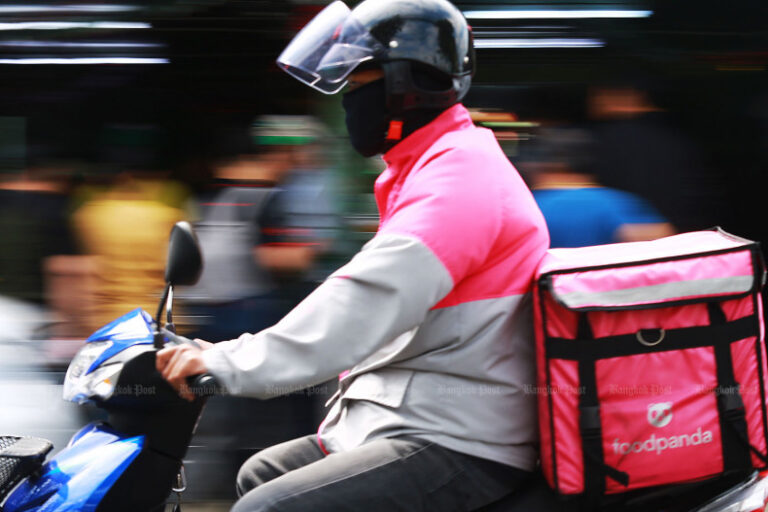
(อ่านภาษาไทยด้านล่าง)
“I was shocked, honestly. I couldn’t prepare myself. I’ve been working for Foodpanda as my main platform, I didn’t run multiple apps. Then suddenly, they announced they were shutting down, and that was it,” said Bebee, a female rider who had been working with Foodpanda in Krabi province since it began operations in 2019.
In April, Foodpanda announced that it will stop operating in Thailand on May 23. While many customers lost a delivery option, thousands of riders like Beebe abruptly lost their main source of income.
Bebee mentioned she had a sense that changes were coming, especially with updates to the app’s system. She thought the company might be adapting to become more like other platforms such as Grab or LINEMAN. But she never expected a total shutdown.
Foodpanda’s presence in Thailand had already been rocky, particularly after facing public backlash in 2021 when the platform linked pro-democracy protesters to terrorism, threatening to terminate the involved rider’s employment. Since then, the platform struggled to regain consumer trust. Its app also lagged behind competitors in terms of usability and updates.
This closure isn’t unique to Thailand, the parent company, Delivery Hero, has also been gradually exiting Denmark, Ghana, Slovakia and Slovenia.
For riders, the impact varies. Those who only worked for Foodpanda are hardest hit, they now face the need to register with new platforms, learn new systems, or consider leaving the profession entirely. Those who were already using multiple apps have lost an option but may still have income sources.
When it comes to compensation, Bebee said the company only offered refunds for the rider 2,000 baht deposit upon registration. Beyond that, no compesation or support was provided. This underscores the persstent issue: the legal precarity of riders, who are not recognized as employees under Thai labor law.
Under Section 118 of Thailand’s Labor Protection Act, workers terminated without cause are entitled to severance pay. For someone like Bebee, who worked with the company for over six years, that could mean 180 days’ worth of final wages. This financial buffer is crucial for transitioning to a new job.
But since riders are not legally classified as employees, they are excluded from these protections, no matter how long or consistently they’ve worked.
Over the past year alone, multiple delivery platforms have shut down operations in Thailand, from Robinhood to now Foodpanda, leaving only a few major players like Grab, LINEMAN, and ShopeeFood. This consolidation alters the platform economy and limits competition, ultimately impacting not just riders, but also small vendors and consumers.
Similar issues have played out elsewhere. In April, Deliveroo shut down operations in Hong Kong, and just like in Thailand, riders received no compensation. Some had worked full-time for up to seven years. Without being legally recognized as employees, they too are seeking legal recourse as a group to demand severance. In contrast, we’ve heard little public response from Foodpanda riders in Thailand. Many seem to have quietly accepted the outcome, either because they don’t know where to turn for support, or because such treatment has become normalized within platform work.
These cases point to a larger structural problem: the fragility and lack of legal protections for platform workers. In a market defined by volatility, platforms come and go, Uber, GET, Foodpanda and others have all entered and exited. But until riders gain formal legal recognition as employees, they will remain vulnerable, facing these shutdowns alone and without recourse.
ทางเลือกที่เหลือของไรเดอร์ในวันที่แพลตฟอร์มปิดตัว
“เอาตรงๆ เราก็ช็อคนะ ตั้งตัวไม่ติด เราขับฟู้ดแพนด้าเป็นหลักเลย ไม่ได้ขับหลายแอพ เพราะเราชินกับระบบแล้ว พออยู่ๆ ประกาศปิดตัวก็ไปเลย เราประกอบอาชีพไรเดอร์เป็นหลัก ถ้าบริษัทปิดตัวไป เราก็มีทางเลือกแค่หาแพลตฟอร์มอื่นหรือไม่ก็ไปหาอย่างอื่นทำเลย ซึ่งอย่างหลังก็ไม่ง่ายแล้ว”
นี่คือเสียงสะท้อนจากบีบี ไรเดอร์หญิงที่ทำงานกับฟู้ดแพนด้ามาตั้งแต่บริษัทเริ่มเข้ามาเปิดบริการในจังหวัดกระบี่ในปี 2563 บีบีขับฟู้ดแพนด้าเป็นแอปพลิเคชันหลัก โดยไม่ได้วิ่งให้กับแอปอื่นด้วย เมื่อฟู้ดแพนด้าประกาศยุติการให้บริการในประเทศไทยเมื่อเดือนเมษายนที่ผ่านมา โดยมีผลในวันที่ 23 พฤษภาคม นอกจากที่ลูกค้าจะขาดทางเลือกในการใช้บริการแอปพลิเคชันส่งอาหารหรือส่งของไปหนึ่งแพลตฟอร์มแล้ว ไรเดอร์จำนวนมากก็ต้องเสียอาชีพไปอย่างกระทันหัน
บีบีเล่าว่าเธอพอจะสัมผัสได้ว่าแพลตฟอร์มอาจเกิดการเปลี่ยนแปลงอะไรบางอย่าง โดยสังเกตจากการอัพเดทระบบและการแสดงผลของตัวแอป เริ่มแรกเธอคิดว่าบริษัทอาจมีการปรับปรุงระบบให้มีความใกล้เคียงกับแอปอื่นๆ เช่น แกรปหรือไลน์แมน แต่เธอกลับไม่ได้คิดว่าจะกลายเป็นการปิดตัวลงอย่างกระทันหันแบบนี้
สำหรับการให้บริการของแพลตฟอร์มฟู้ดแพนด้าในประเทศไทย ก็มีกระแสมากมายที่ส่งผลต่อภาพลักษณ์และการเลือกของผู้บริโภค ตั้งแต่เกิดข้อวิพากษ์ครั้งใหญ่จากกรณีที่แอปประกาศให้ไรเดอร์ที่มีข่าวเกี่ยวข้องกับประเด็นทางการเมืองออกจากงาน จนทำให้เกิดกระแสสังคมที่หนักและรุนแรงจนส่งผลมาถึงปัจจุบัน อีกทั้งในด้านการใช้งาน แอปยังไม่ได้พัฒนารวดเร็วเท่าแพลตฟอร์มอื่นๆ ที่ให้บริการในลักษณะเดียวกัน ซึ่งจากการประกาศปิดตัวนั้นก็ไม่ใช่แค่ในประเทศไทย แต่บริษัทแม่อย่าง Delivery Hero ได้ทยอยปิดกิจการฟู้ดแพนด้าในหลายประเทศ เช่น เดนมาร์ก กาน่า สโลวาเกีย และสโลวีเนีย
ในแง่ผลกระทบต่อคนทำงาน แน่นอนว่าการปิดตัวครั้งนี้ส่งผลให้ไรเดอร์จำนวนมาก ซึ่งอาจแบ่งออกเป็นสองกลุ่ม ได้แก่ กลุ่มที่วิ่งฟู้ดแพนด้าแพลตฟอร์มเดียวและกลุ่มที่วิ่งหลายแพลตฟอร์ม สำหรับกลุ่มหลังนั้น นอกจากการสูญเสียทางเลือกในการทำงานไปก็อาจไม่ได้รับผลกระทบเท่ากับกลุ่มแรก ที่ต้องสมัครทำงานกับแพลตฟอร์มใหม่ ทำความเข้าใจกับระบบใหม่ หรือแม้แต่พิจารณาหันไปประกอบอาชีพอื่น
การปิดกิจการก็หมายถึงการเลิกจ้าง บีบีเล่าว่าบริษัทออกประกาศให้ไรเดอร์ที่เคยจ่ายเงินประกันจำนวน 2,000 บาท ส่งคำร้องไปเพื่อขอรับเงินคืนได้ แต่นอกจากนั้นแล้ว ก็ไม่ได้มีการชดเชย เยียวยาหรือสนับสนุนใดๆ จากแพลตฟอร์มอีก ซึ่งตอกย้ำให้เห็นถึงความไม่มั่นคงในสถานภาพการจ้างงานของไรเดอร์
หากไรเดอร์มีสถานะเป็นลูกจ้างตามกฎหมาย หากนายจ้างเลิกจ้างกระทันหันหรือปิดกิจการ ลูกจ้างจะต้องได้รับการชดเชยตามกฎหมายแรงงาน มาตรา 118 โดยคำนวณจากเงินเดือนหรือค่าจ้างงวดสุดท้าย ในกรณีของบีบีที่ทำงานมาเป็นเวลากว่า 6 ปี ก็ควรได้รับเงินชดเชยเท่ากับค่าจ้างสุดท้าย 180 วัน ซึ่งเงินจำนวนนี้สามารถนำไปดำรงชีวิตในช่วงที่กำลังวางแผนและยังไม่สามารถหางานใหม่ได้
แต่เพราะไรเดอร์ยังไม่มีสถานะเป็นลูกจ้าง แม้จะทำงานมายาวนานเพียงใดก็ไม่ได้รับความคุ้มครองตามกฎหมายเหล่านี้ ทำให้เมื่อเกิดเหตุการณ์นี้ขึ้นก็ต้องแบกรับผลกระทบและหาทางแก้ไขด้วยตัวเองโดยไม่มีช่องทางขอความช่วยเหลือใดๆ ในช่วงเวลาเพียงหนึ่งปี มีบริษัทแพลตฟอร์มปิดตัวในไทยแล้วตั้งแต่โรบินฮู้ดจนถึงฟู้ดแพนด้า ทำให้ผู้เล่นหลักในตลาดเหลือเพียงแค่แกรป ไลน์แมน และช้อปปี้ฟู้ด ส่งผลต่อโครงสร้างการแข่งขันระหว่างแพลตฟอร์ม ซึ่งแน่นอนว่าผู้ได้รับผลกระทบก็คือไรเดอร์ ร้านค้า และผู้บริโภคนี่เอง
ตัวอย่างที่คล้ายกันคือ Deliveroo ที่ปิดตัวลงในฮ่องกงเมื่อเดือนเมษายนที่ผ่านมา แน่นอนว่าเหมือนกับฟู้ดแพนด้าในไทยที่ไม่ได้มีการชดเชยหรือเยียวยาใดๆ จึงมีกลุ่มไรเดอร์ที่รวมตัวกันฟ้องเรียกค่าชดเชย ซึ่งในกลุ่มนี้มีคนที่ทำงานเต็มเวลายาวนานถึง 7 ปี แต่ก็ไม่ได้รับการยอมรับเป็นลูกจ้าง
นี่จึงเป็นตัวอย่างของความเปราะบางและไม่มั่นคงของอาชีพไรเดอร์ในปัจจุบัน ด้วยความผันผวนและไม่แน่นอนของตลาดและเศรษฐกิจ ทุกอย่างมีความเป็นไปได้ เมื่อมองย้อนกลับไปก็มีบริษัทแพลตฟอร์มที่เข้ามาและออกไป ไม่ว่าจะเป็น UBER GET หรือฟู้ดแพนด้าล่าสุดนี้ แต่ตราบใดที่ไรเดอร์ยังไม่มีสถานะเป็นลูกจ้างทางกฎหมาย เมื่อเหตุการณ์แบบนี้เกิดขึ้นอีก ไรเดอร์ก็ยังคงถูกลอยแพให้รับมือกับผลกระทบอย่างโดดเดี่ยวต่อไป
Reference
- Chaninart Songmahadthai. (23 May 2025). Interview
- South China Morning Post. (7 April 2025). Deliveroo riders take legal action over compensation as platform exits Hong Kong. https://www.scmp.com/news/ hong-kong/hong-kong-economy/ article/3305563/deliveroo-riders-take-legal-action-over-compensation-platform-exits-hong-kong
- Foodpanda delivery service to exit Thailand. (22 April 2025). Bangkok Post. Retrieved from https://www.bangkokpost.com/business/general/3009501/foodpanda-delivery-service-to-exit-thailand
